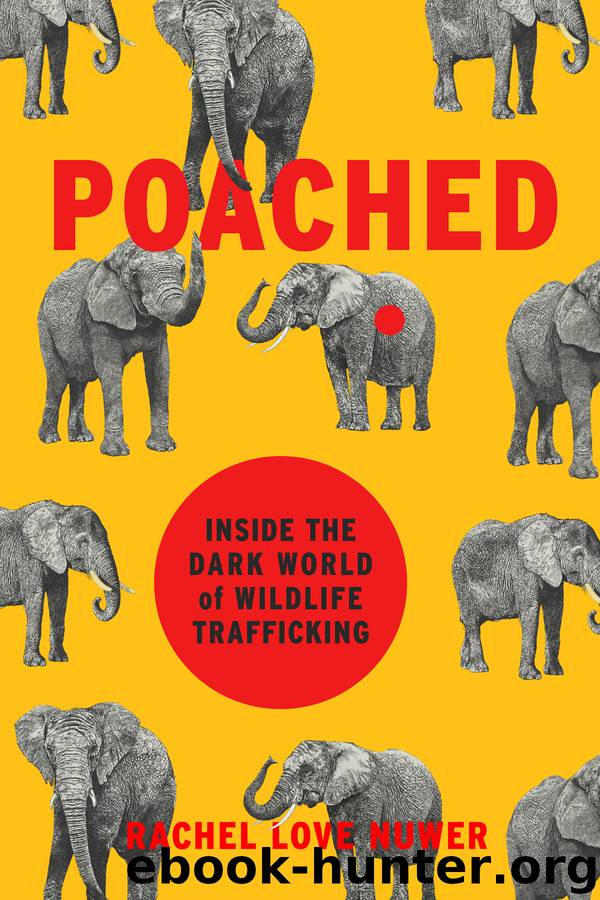Poached by Rachel Love Nuwer

Author:Rachel Love Nuwer
Language: eng
Format: epub
Publisher: Da Capo Press
Published: 2018-09-24T16:00:00+00:00
ONCE A HORN, TUSK, BAG OF BONES, OR BOX OF SCALES IS SMUGGLED OUT OF A park like Kruger, what happens next?
Usually, the goods are transferred along a chain of “runners” who take them to larger and larger cities. At some point, though, Africa-based Asian businessmen who act as bosses on the national level are almost guaranteed to get involved—generally Vietnamese for rhino horn, Chinese for ivory and abalone.
“Africa has never seen as many Asians on this continent as there are today, especially Chinese,” said Tom Milliken, who runs TRAFFIC’s elephant and rhino programs. “My wife is Japanese, and every shop she goes into these days in Zimbabwe, she’s greeted in Chinese.” China ranks as the largest foreign commerce partner of many African nations, including South Africa. Its involvement traces back to the Cold War, when Western nations stopped investing there and China stepped up to fill the gap. Since then, the country’s provision of contracts, loans, and infrastructure development across the continent—oftentimes in exchange for raw materials—has only grown, hitting an estimated $200 billion in 2012. At least a million Chinese have moved to Africa over the past twenty-odd years in pursuit of jobs, opportunity, and freedom from the state. Some play a role in robbing their adopted home of its wildlife. In 2011, for example, more than 150 Chinese citizens were arrested in Africa for trafficking ivory, while Kenya alone reports that 95 percent of people caught smuggling ivory out of the Nairobi airport fit that demographic. Yet in 2013, Shifan Wu, a spokesperson for the Chinese embassy in Nairobi, claimed, “The number of Chinese nationals involved in ivory smuggling and illegal trade are very few.”
In addition to denying or downplaying the problem, diplomats themselves sometimes become involved. Julian has found evidence of around thirty embassy employees in Africa trafficking in rhino horn or ivory. Almost all of them were Vietnamese, Chinese, or North Korean, and none of the cases have resulted in jail time. “The police don’t always feel they have the political support to take action when diplomats are caught,” Julian said. “So, invariably, nothing happens.”
The Vietnamese embassy in Pretoria has a particularly shameful history of abuse. In 2006, for example, Vietnam’s economic attaché to South Africa was arrested for possession of two rhino horns, while, in 2010, another senior diplomat was filmed conducting a rhino horn transaction out of the trunk of her car, parked directly in front of the embassy. Following the latter incident—which aired on national television—the diplomat insisted that she was “helping the dealer with his paper work.” In both cases, the alleged culprits were recalled to Vietnam, but the problems have continued. For example, Vietnamese embassy officials—including an ambassador to South Africa—regularly visited and hunted on a game farm owned by a convicted Vietnamese rhino horn smuggler and business tycoon, according to Julian’s published investigations. The Vietnamese embassy, Julian said, ignored his request for comment.
Others also emphasize Vietnam’s role in the upsurge in rhino poaching—both in South Africa and beyond. “The
Download
This site does not store any files on its server. We only index and link to content provided by other sites. Please contact the content providers to delete copyright contents if any and email us, we'll remove relevant links or contents immediately.
Sapiens: A Brief History of Humankind by Yuval Noah Harari(14392)
The Tidewater Tales by John Barth(12662)
Mastermind: How to Think Like Sherlock Holmes by Maria Konnikova(7351)
The Thirst by Nesbo Jo(6946)
Do No Harm Stories of Life, Death and Brain Surgery by Henry Marsh(6944)
Why We Sleep: Unlocking the Power of Sleep and Dreams by Matthew Walker(6727)
Life 3.0: Being Human in the Age of Artificial Intelligence by Tegmark Max(5559)
Sapiens by Yuval Noah Harari(5374)
The Body: A Guide for Occupants by Bill Bryson(5100)
The Longevity Diet by Valter Longo(5067)
The Rules Do Not Apply by Ariel Levy(4972)
The Immortal Life of Henrietta Lacks by Rebecca Skloot(4592)
Animal Frequency by Melissa Alvarez(4474)
Why We Sleep by Matthew Walker(4449)
The Hacking of the American Mind by Robert H. Lustig(4386)
Yoga Anatomy by Kaminoff Leslie(4364)
All Creatures Great and Small by James Herriot(4326)
Double Down (Diary of a Wimpy Kid Book 11) by Jeff Kinney(4275)
Embedded Programming with Modern C++ Cookbook by Igor Viarheichyk(4182)
